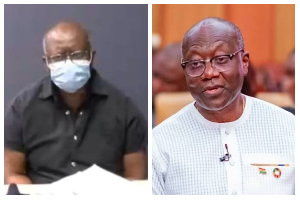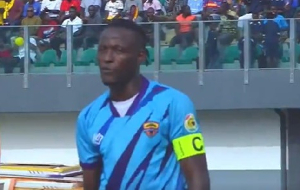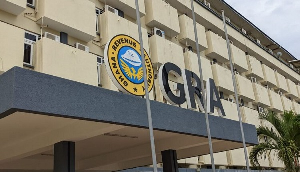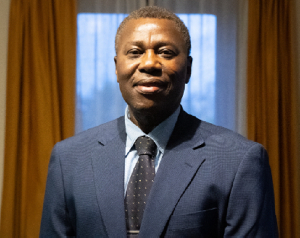Exactly a year ago, Eric Amoateng, MP for Nkoranza North, was arrested and detained in USA on narcotic charges. Since then that constituency has not been represented in Parliament, in clear violation of the constitutional command that “each constituency shall be represented by one MP” (article 47(1)). Not too surprisingly, Parliament short-changed the people of Ghana when in February 2006, the legislative body attempted to sanction Amoateng’s continued, indefinite, and unauthorized absence from Parliament.
Parliament’s action was not surprising since it is a political body that often decides based on political considerations. A similar political maneuver was executed in 1959 when Dr. K. A. Busia, then a minority MP, was ousted from Parliament when he missed the then statutory number of sittings. Busia, who was on a three-month lecture tour of Europe, had been denied permission to be absent from Parliament. No reason was assigned for the denial of his leave of absence.
It was to avoid such political calculus that Article 99 (1) (a) of the current constitution provides that “the High Court shall have jurisdiction to hear and determine any question whether a person has been validly elected as a member of Parliament or the seat of a member has become vacant.” The rational behind the reservation of this power to the judiciary is to avoid politicizing the “vacation decision,” which will oppress the minority (as in the Busia case) or the constituents (as in the current Amoateng case). Notice that Article 99 (1)(a) requires the court to hear and determine not to defer to Parliament or any other authority.
To undo Parliament’s political decision, I petitioned the high court to declare the seat vacant under its powers under article 99(1). In that suit, I contended that the seat had become vacant by operation of law; that the handling of a private criminal dispute is not a reasonable explanation to be absent from parliament; that an explanation is per se unreasonable if its acceptance will result in an indefinite absence from a parliament; that parliament is without authority to grant an indefinite leave of absence to an elected MP thereby negating the constituents’ vote; that the speaker’s permission to the MP had lapsed and hence there was never a concurrence of permission and explanation as required by the constitution; and that the constituents’ right to representation was paramount (see Stephen Asare v. Attorney General et al. AP 21/2006 HC Available at http://www.ghanaweb.com/GhanaHomePage/NewsArchive/artikel.php?ID=110647 ).
The court refused to declare the seat vacant on grounds that the “the political question doctrine applies.” The court’s decision is erroneous and must be reversed for 4 reasons: (1) Political doctrine is not a talisman; (2) Political doctrine has dubious grounding in the 1992 constitution; (3) Political doctrine is based on a dubious precedent; (4) Political doctrine has fallen on bad times even in its own original home.
It is useful to start with an explanation of the so called Political Question doctrine. According to the political question doctrine courts should abstain from resolving constitutional issues that are better left to other political branches of government. It is a USA Supreme Court made doctrine that has no universal application. The USA Supreme Court defined the contours of the doctrine in Baker v. Carr, 369 U.S. 186, 217 (1962) as follows: “Prominent on the surface of any case held to involve a political question is found a textually demonstrable constitutional commitment of the issue to a coordinate political department; or a lack of judicially discoverable and manageable standards for resolving it; or the impossibility of deciding without an initial policy determination of a kind clearly for nonjudicial discretion; or the impossibility of a court's undertaking independent resolution without expressing lack of the respect due coordinate branches of government; or an unusual need for unquestioning adherence to a political decision already made; or the potentiality of embarrassment from multifarious pronouncements by various departments on one question.”
Political Doctrine is Not a Talisman
In the Amoateng case, Judge Ayebi invoked the political doctrine question as if it was a talisman whose invocation settles the issues. But the doctrine is not a talisman and it is up to a judge to explain why that doctrine should control. Unfortunately, Judge Ayebi’s opinion does not explain the rational behind allowing the “political question doctrine” to swallow its explicit powers under article 99(1)(a). Nor does the court attempt to distill the values behind the conferral of jurisdiction to the court (i.e., the Busia problem). Further, the court does not take into account the right to vote. The right to vote means more than casting a vote on election-day. Rather, it embraces pre-ballot rights, such as the right to register, and post-ballot rights, such as the right for the vote to be counted and to count (e.g., by being represented). Needless to say, that right does not extend to being represented effectively but it requires attendance. Non-attendance negates the right and comes with the stiff penalty in article 97 (1) (c) “A member of Parliament shall vacate his seat in Parliament if he is absent, without the permission in writing of the Speaker and he is unable to offer a reasonable explanation to the Parliamentary Committee on Privileges from fifteen sittings of a meeting of Parliament during any period that Parliament has been summoned to meet and continues to meet.”Judge Ayebi acknowledged the three prong test adopted by Justice Kpegah in Ghana Bar Association v. Attorney-General et al. SC GLR 250 (2003-2004) (Justice Abban’s case): [Justice Kpegah adopted the test from the concurring opinion of Justice Powell in Goldwater v. Carter 444 US 996.]
(a) Does the issue involve resolution of questions committed by the text of the Constitution to a co-ordinate branch of government?
(b) Would the resolution of the question demand that a court moves beyond areas of judicial expertise?
(c) Do prudential considerations counsel against judicial intervention?
Nevertheless beyond the conclusory opinion that the political doctrine applies, the court did not apply the test to the facts of the case. In light of the court’s Article 99 (1) (a) jurisdiction, it cannot be seriously argued that the issue of whether a seat has become vacant is committed to parliament. The court’s exclusive focus on Article 97 (1) (c) is mechanistic and fails to take into account the obvious rational of article 99 (1) (a) and the Busia problem. Certainly, determining whether an indefinite absence from a legislative body where a person has been chosen to represent constituents for a definite period is hardly requires the court to move beyond the judicial expertise. Plainly, prudential considerations will command judicial intervention when voters’ right for their votes to count is being trampled upon.
Thus, assuming that the test laid down by Justice Kpegah is apt, Judge Ayebi does not show that the test is met by the facts of Amoateng case. Hence, the political doctrine question cannot settle the dispute as to whether Amoateng has vacated his seat. But it gets worse because the political question doctrine has dubious constitutional and precedential grounding
The Political Doctrine has Dubious Constitutional and Precedential Grounding
There is considerable dispute as to the applicability of the political question doctrine to the 1992 constitution. Both judge Ayebi and Justice Kpegah improperly rely on the Amoako-Tuffuor case (Amoako-Tuffuor v. Attorney-General GLR 63, SC (1980) as authority for the political doctrine question. But the political doctrine question was not at issue in Amoako-Tuffuor, nor was the holding in Tuffuor an endorsement of or even a clarification of the doctrine. Rather, the holding in Amoako-Tuffuor was a narrow one and to the effect that upon coming into force of the 1979 constitution, Justice Apaloo was constitutionally in office and hence his removal could be effected only in accordance with procedures stipulated by that constitution. Significantly, the Amoako-Tuffuor holding had the effect of undoing the parliamentary vetting and rejection of Justice Apaloo as Chief Justice. The continued and improper reliance on Amoako-Tuffuor then stems from dicta in Amoako-Tuffuor discussing the extent to which the courts can question decisions done in and by the 1979 Parliament.In the December 31st case, the doctrine was explicitly raised and rejected by the Supreme Court as inapplicable to the 1992 constitution (rejecting the argument that the question of whether December 31 is a public holiday was a political question not properly determined by the Supreme Court and holding that “. . . courts and tribunals much lower in hierarchy than the Supreme Court may lawfully decide cases which may involve political questions”). (see NPP v. Attorney-General 2 GLR 35 at 65 (1993-94).
The political question doctrine was invoked and rejected again in J. H. Mensah v. Attorney-General (see SCGLR 320, 364-69 (1996-97). In Mensah, the Attorney-General argued that the political doctrine question should bar the court from reviewing the process by which parliament exercises its sovereign power. The issue was whether holdover ministers from the prior parliament should be subject to another round of vetting in the new parliament. Writing for a unanimous court, Justice Acquah reviewed the contours of the doctrine as it applied in USA and noted that its application is “quite variable.”
Importantly, Justice Acquah distinguished the power of judicial review of the USA and the Ghana Supreme Courts. The former was derived from case law; hence the USA Supreme Court could devise doctrines to circumscribe its use. The latter was invested in the Ghana’s Supreme Court and can be circumscribed only by specific language in the constitution. “Accordingly, the political doctrine question cannot forbid the Supreme Court from determining the authenticity of an allegation that Parliament’s conduct is inconsistent with a provision of the constitution. “Indeed no judicial self-restraint doctrine can sufficiently assist the Ghana Supreme Court to refrain from deciding cases involving the constitutionality or otherwise of a law or action or omission of any authority.”
The concurring opinion of Justice Aikins was even more emphatic in holding that to allow the political doctrine question to bar the Court from reviewing an alleged unconstitutional act of Parliament “will be subverting the Constitution and the rule of law.” Justice Kpegah, therefore, appears to be alone in his views on the applicability of the political question doctrine. For instance, Justice Hayfron-Benjamin declined the invitation to apply the doctrine (“I do not think it is necessary for me in this opinion to discuss the principle of the non-justiciable political question”). Similarly, Justice Wiredu opined that the “the constitution has done away with either executive or parliamentary sovereignty.”
While Justice Kpegah held that the doctrine applied to the 4th Republic constitution, the Abban case was decided on the nature of the plaintiff’s claim which sought to remove Justice Abban from the bench without following the constitutional procedures for removing a judge from the bench.
This insistence on applying the political doctrine question to the 4th republican constitution ignores Justice Kpegah’s caution “against the adoption of the unexpurgated jurisprudence of other countries; a legal philosophy which may be based solely on their peculiar experiences.” (see Republic v Independent Media Corp SCGLR 258 at 269[1996-97]).
A similar caution was given by Justice Archer in the Sallah case: “Constitutio est exercitus judicum tutissimus ductor (the constitution is the safest leader of the army of judges – not esoteric legal philosophies” (see Sallah v. Attorney General 2 G&G 493 at 498 [1970]).
The Doctrine Has Fallen on Bad Times even in USA
In the USA, the doctrine has come under serious and sustained attack. Critics of the doctrine argue that the doctrine should play no role in the exercise of judicial review power; that the doctrine confuses deference with abdication; that the doctrine is confusing and unsatisfactory; and that the criteria specified in Baker are “useless” in identifying what constitutes a political question. ConclusionThe constitution demands that a court should hear and determine issues as to whether a parliamentary seat has become vacant. The court cannot abdicate this responsibility by invoking doctrines of dubious application. Hear and determine means the court must independently inquire into the reasons for the absence, the expected length o the absence, whether permission was given, how long such permission was given, whether the permission lapsed, etc
Judge Ayebi’s invocation of the political doctrine question is legal error that must be set aside by the appeal court. It is up to the court of appeals to hear the appeal immediately for the sake of constitution and common sense!
















